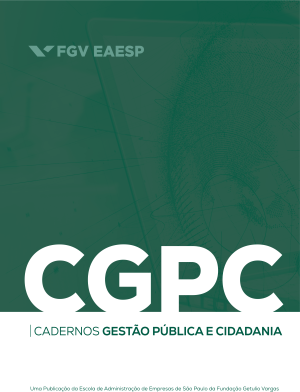The politics and economics of the Bolsonaro government: an analysis of budget capture
Main Article Content
Abstract
This article aims to analyze the late Bolsonaro administration from the point of view of the ability to arbitrate the distributive conflict and to govern. To do that, the 2021/2022 budget process is analyzed. The analysis focuses on political economy and politics. It starts from the assumption that the budget is the expression of distributive conflicts inherent to society and that they must be arbitrated at the cost of loss of agenda items and lack of a control of fiscal policy. The article describes how institutional and structural elements are behind the construction of credible, sustainable and effective budgets, as well as their opposites. First, a political economics analysis is carried out, followed by political science. The conclusion is that the 2021/2022 budget process is a symptom of the governance crisis, as there is evidence that there was no arbitration of the distributive conflict.
Downloads
Article Details

This work is licensed under a Creative Commons Attribution 4.0 International License.
Authors publishing in this journal agree to the following terms:
The authors have the copyright and grant the journal the right of first publication. The authors’ work is also licensed under the Creative Commons Attribution License (CC BY 4.0), allowing sharing its content since acknowledging authorship and first publication in this journal.
Authors are authorized to take on additional contracts separately for the non-exclusive distribution of the version of the work published in this journal since acknowledging authorship and first publication. For example, the authors may publish the content in institutional repositories or as a book chapter).
Authors are encouraged to distribute the publication online (e.g., in institutional repositories or on their personal webpage, among others), as this can lead to improvements and increase impact and citation of the published work. For more information, please check The effect of open access.
Cadernos Gestão Pública e Cidadania (CGPC) (Public Management and Citizenship Journal) is a journal committed to contributing to the protection of the author's rights. In this sense:
- Moral rights and rights of use of the article are secured to the author;
- It adopts the Creative Commons BY (CC-BY) license in all texts published;
- It uses similarity-detection software (iThenticate);
- The journal undertakes measures to fight plagiarism and ethical misconduct, in line with the guidelines of the Committee on Publication Ethics (COPE).
For more information, please see CGPC Ethics & Conduct.
References
Adolph, C., Breunig, C., & Koski, C. J. (2012). The Political Economy of Budget Trade-Offs. Journal of Public Policy, 40(1), 1-26. doi:10.1017/s0143814x18000326 DOI: https://doi.org/10.1017/S0143814X18000326
Abranches, S. (1998). Presidencialismo de coalizão: O dilema institucional brasileiro. Dados - Revista de Ciências Sociais, 31(1),5-38. Recuperado de http://dados.iesp.uerj.br/artigos/?id=348
Alesina, A. (1995). The Political Economy of Budget Deficits. IMF Staff Papers, 42(1)1-31. doi: 10.2307/3867338 DOI: https://doi.org/10.2307/3867338
Avritzer, L. (2018). O pêndulo da democracia no Brasil: Uma análise da crise 2013-2018. Novos estudos CEBRAP, 37(2), doi: 10.25091/S01013300201800020006 DOI: https://doi.org/10.25091/S01013300201800020006
Bonfiglioli, A. & Gancia, G. (2013). Uncertainty, Electoral Incentives and Political Myopia. Economic Journal, 123(568), 373-400. Recuperado de https://www.jstor.org/stable/23470592 DOI: https://doi.org/10.1111/ecoj.12029
Borges, A. (2021). The Illusion of Electoral Stability: From Party System Erosion to Right-Wing Populism in Brazil. Journal of Politics in Latin America, 13(2)166–191, doi: 10.1177/1866802X211005164 DOI: https://doi.org/10.1177/1866802X211005164
Couto, L., Soares, A., & Livramento, B. (2021). Presidencialismo de coalizão: Conceito e aplicação. Revista Brasileira de Ciência Política, (34), 2021, doi: 10.1590/0103-3352.2021.34.241841 DOI: https://doi.org/10.1590/0103-3352.2021.34.241841
Couto, C. & Silva, M. G. S.. (2017). A Economia Política do Conflito Distributivo. Recuperado de https://www.jota.info/opiniao-e-analise/colunas/cepesp/economia-e-politica-do-conflito-distributivo-20122017
Dahl, R. (2001). Sobre a democracia. Brasília, DF: Editora UnB.
Eslava, M. (2012). The Political Economy of Public Spending and Fiscal Deficits: Lessons for Latin America. Oxford, UK: Oxford University Press. DOI: https://doi.org/10.1093/oxfordhb/9780199747504.013.0019
Folha de S. Paulo (2015, 20 de maio). Bancada de FHC no Congresso sofre retração. Recuperado de https://www1.folha.uol.com.br/fsp/brasil/fc2005200105.htm.
Graeber, D. & Wengrow, D. (2021). The Dawn of Everything: A New History of Humanity. New York: Farrar, Straus and Giroux.
Stein, E. H., Hallerberg, M., & Scartascini, C., (Eds.) (2009). Who Decides the Budget? A Political Economy Analysis of the Budget Process in Latin America. Washington, D.C: Inter-American Development Bank.
Mendes, M. (2014). Por que o Brasil Cresce Pouco?. Rio de Janeiro, RJ: Elsevier; Campus.
Olson, M. (2009). The Logic of Collective Action. Cambridge, MA: Harvard University Press. DOI: https://doi.org/10.2307/j.ctvjsf3ts
Scott, J. C.. (2017). Against the Grain: A Deep History of the Earliest States. Connecticut: Yale University Press. DOI: https://doi.org/10.2307/j.ctv1bvnfk9
Teixeira, M. A C. (2021a). Em defesa da democracia. GV Executivo, 20(3), doi: 10.12660/gvexec.v20n3.2021.84618 DOI: https://doi.org/10.12660/gvexec.v20n3.2021.84618
Teixeira, M. A. C. (2021b). Emendas parlamentares, orçamento secreto e desequilíbrio da democracia. GV Executivo, 20(4). doi: 10.12660/gvexec.v20n4.2021.85087 DOI: https://doi.org/10.12660/gvexec.v20n4.2021.85087
Tenorio, F. G, & Teixeira, M. A. C. (2021). O conceito de gestão social e a democracia regressiva no Brasil após 2016. Administração Pública e Gestão Social, 13(2), doi: 10.21118/apgs.v13i2.10767 DOI: https://doi.org/10.21118/apgs.v13i2.10767
Urbinati, N. (2006). O que torna a representação democrática? Lua Nova (67), doi: 10.1590/S0102-64452006000200007 DOI: https://doi.org/10.1590/S0102-64452006000200007
Weffort, F. C. (Org.) (2001). Os clássicos da política: Maquiavel, Hobbes, Locke, Montesquieu, Rousseau, “o Federalista”. São Paulo, SP: Ática.
Wildavsky, A., & Caiden, N. (2003). The New Politics of the Budgetary Process. Longman Classics Series, Londres, Uk: Pearson.







